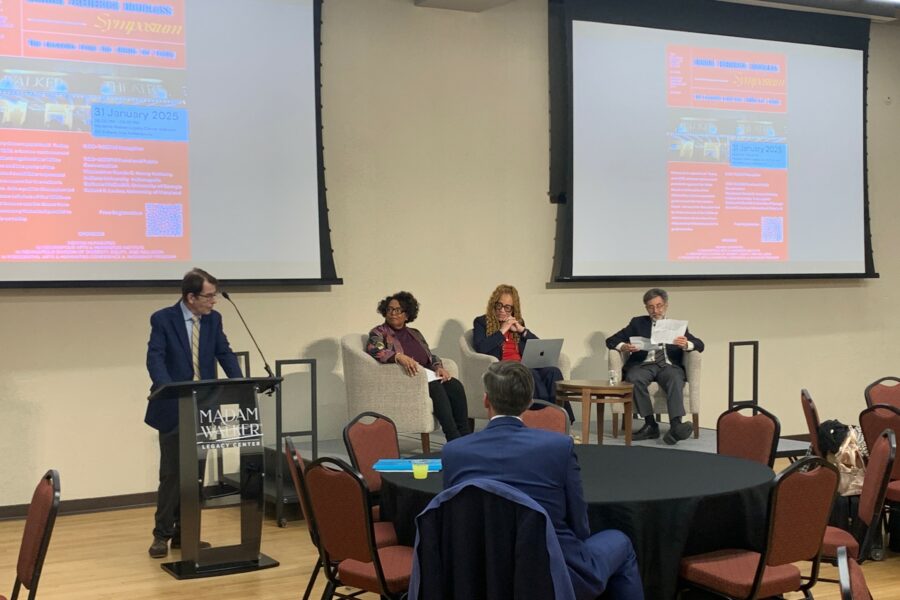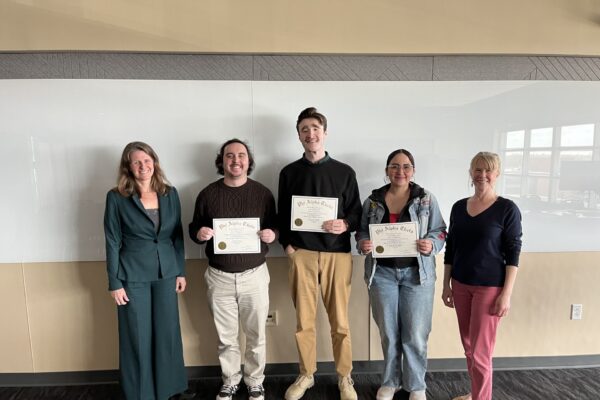
Why do we look back at the past? Does the study of history help us avoid past mistakes? Or, does it simply repeat itself, catching us in a wheel of fate? Maybe history doesn’t repeat itself, but actually, “often rhymes” as Mark Twain allegedly said?
These were the questions behind the 2025 Frederick Douglass symposium, “The Lessons from the 1890s for Today” that took place at the Madam C.J. Walker Theater and Benjamin Harrison Presidential Site on January 30-31, The Frederick Douglass symposium is a biennial event organized by Dr. John R. Kaufman-McKivigan, Director of the Frederick Douglass Papers and Mary O’Brien Gibson Professor of History, Africana Studies, at IU Indianapolis. The symposium brings together experts from across the country to discuss current research on the life and works of Frederick Douglass, one of the United States’ leading intellectuals and civil rights activists of the 19th century. The first symposium took place in 2012. This year marks the sixth symposium.
The symposium opened with a reception in the Walker Theater ballroom, where attendees and speakers connected over food and conversation. As the event commenced, Barbara McCaskill, Professor of English at the University of Georgia, and Robert S. Levine, Professor of English at the University of Maryland, led the discussion. The panel was moderated by IU Indianapolis’ own Ronda C. Henry Anthony, Professor of English and Africana Studies.
During the discussion, the speakers shared surprising insights from their historical research on the relationship between Frederick Douglass and President Benjamin Harrison. They uncovered an unexpected admiration and respect that Douglass held for Harrison, recognizing the president’s genuine efforts to advance social justice in the post-Civil War United States. The conversation also highlighted the uncertainty many African Americans felt during the 1893 election. Progressive hopes had largely been tied to Harrison’s reelection, but he ultimately lost to Grover Cleveland—the same opponent he had defeated in 1888.
The second day of the symposium took a deeper dive into the historical landscape of the 1890s, focusing on the presidency’s role in navigating racial politics in the post-war South. Held at the Benjamin Harrison Presidential Site in Indianapolis, the event brought together scholars from various academic institutions to explore the historical parallels between the presidency of the 1890s and today. Featured speakers included Charles W. Calhoun of East Carolina University, Charlene J. Fletcher of Butler University, Shawn Leigh Alexander of the University of Kansas, Edward O. Frantz of the University of Indianapolis, and John R. Kaufman-McKivigan of Indiana University Indianapolis.
This symposium was presented as an opportunity to draw meaningful lessons from the past to address present-day issues. However, over the course of these two days, we were reminded that history is more than just identifying parallels between then and now. The speakers uncovered a dynamic and evolving relationship between our present, Benjamin Harrison, and Frederick Douglass—one that was richer and more complex than expected.
This dynamism is at the very heart of studying history. The lens through which we view the past is constantly shaped by present events, and our lived experiences influence how we interpret and challenge historical narratives. While history may not offer a definitive lesson or a “crystal ball” for the future, it continually provides new insights—about both our predecessors and ourselves—that guide us forward with greater understanding and clarity.
The 2025 Frederick Douglass Symposium was sponsored by Indiana Humanities, the IU Indianapolis Arts and Humanities Institute, the IU Indianapolis Division of Diversity, Equity, and Inclusion, and the IU Presidential Arts and Humanities Conference and Workshop Program. The History Department looks forward to another successful symposium in two years!


